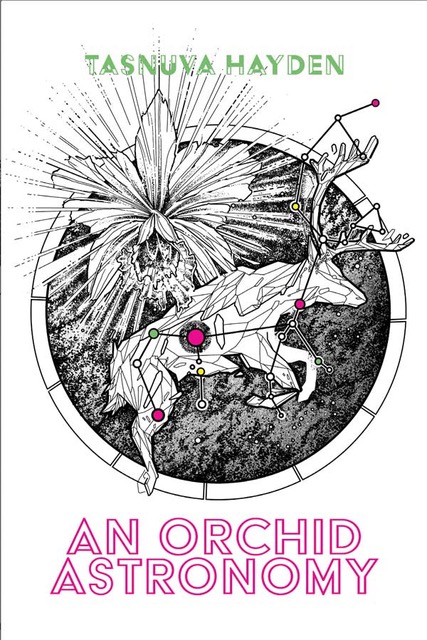Calgary author Tasnuva Hayden’s debut book of poetry defies every convention of written verse with inventive new forms of visionary lyricism. Eluding structural description, An Orchid Astronomy charts thinking’s scrambled, non-linear course as “Sophie” (as lyrical subject and conceptual persona) processes traumatic memories of mamma’s suicide, an illicit affair and a suspicious death, in the wake of larger, existential crises such as circumpolar melting, mass extinction, dying oceans and universal entropy. How, Sophie implicitly, insistently asks, can one make sense of one’s enigmatic mortality in the Anthropocene, where life, love and death bind so intimately with cosmic chaos?
Sophie probes the world’s dark mysteries by the light of northern Norway’s sky, where Polaris, the moon and aurora borealis illumine the sunless landscape of polar night. The poem divides Sophie’s quest/questioning into five reiterative sections of hermeneutic refrains, each headed by a page of luminary words, printed white-on-black in the arrangement of constellations Corona Borealis, Ursa Minor, Lyra, Cassiopeia and Cygnus. Sarvvis, the reindeer asterism by which the nomadic Sami navigated the solar year, appears as a recurrent motif, as does the star-petalled boreal “orchid.” Together, they signal the astronomical spiralling of Sophie’s thoughts around a metaphysical black hole. (The book’s cover features both against a Sami star wheel.)
Troubled by fragmentary traumatic memory as much as by climate calamity, Sophie’s quest for (self)understanding grasps inchoately at all available knowledge systems: Sami cosmology and cosmic physics, animistic shamanism and evolutionary biology. Her thinking occupies parallel realities (Indigenous/cosmopolitan), just as her narrative reiteration of mourning and longing juggles ontological skepticism and mathematical truth. At times, Sophie disappears altogether in a space-time continuum too galactic and too atomistic to fathom: “between nebulae to the centre of a cesium atom….”
What fascinates is the nebulous array of refrains, culled from the quest literatures of childhood fantasy, narrative romance, astronomical physics, Sami mythology, evolutionary theory, climate science (and more). If the poem fails to solve those mysteries generated by Sophie’s polymath soul-searching, it more than succeeds in composing a zeitgeist of inscrutable haunting. There is a beauty, a terrible beauty, to this fragmentary assemblage where orchids and constellations, polar bears and underage affairs, suicide, murder and global warming share the same collision course with mass extinction.
Dianne Chisholm is a professor emeritus of English at the U of A.
_______________________________________


